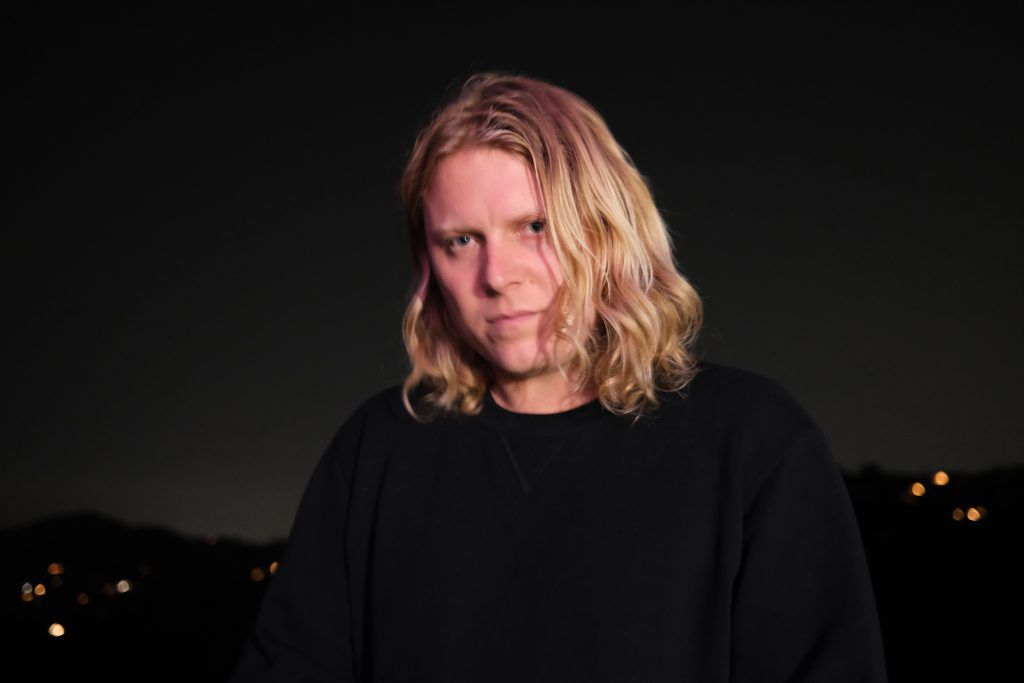Interviste
Armonizzatore (r)Umorale: intervista a Ty Segall

Ty Segall è tornato. Beh, certo, non se n’era mai andato, anzi, è sempre con noi, ma, che ci crediate o no, “Harmonizer” (qui la nostra recensione) è il suo primo disco “solista” da “First Taste” del 2019, e segna un cambiamento se non sostanziale sicuramente importante nel suo sound. Ne abbiamo parlato con il diretto interessato.
Ciao Ty, come stai passando questi tempi difficili? Qui da noi in Italia stiamo cercando di capire cosa farà il governo circa i concerti dal vivo, ma dire che siamo in alto mare è un eufemismo. Da voi com’è la situazione?
Tutto bene qui a L.A., grazie! È tutto ancora molto strano, ma sto tornando al lavoro, cercando di stare più attento possibile, quindi sto bene!
Il tuo nuovo album prende il nome dal tuo nuovo studio di registrazione. Quando hai sentito la necessità di avere uno spazio tutto tuo in cui lavorare alla tua musica? Ma, soprattutto, cos’è cambiato rispetto a quando registravi altrove? Le dinamiche di composizione hanno subìto un cambio di passo significativo o lavori bene o male come facevi in passato?
Sono davvero fortunato ad avere una sorta di studio in casa negli ultimi sei o sette anni ed è diventato parte integrante del mio modo di lavorare. Dal mio punto di vista la differenza più grande tra un home studio e andare a registrare nello studio di qualcun altro risiede nel non sentire la pressione del tempo contato. Per fartela breve non mi sono mai sentito come se fossi “in servizio”, per così dire. Ma poi è davvero grandioso avere un’idea e poter scendere al piano di sotto per registrarla immediatamente. Comunque continuo ad amare l’idea di registrare altrove per ottenere un altro tipo di suono!
Già in “Freedom Goblin” si cominciava a sentire un certo tipo di influenza elettronica farsi strada nei brani, su “Harmonizer” è ancor più evidente e presente. La title-track, ad esempio, ha questa ritmica…come potrei chiamarla…boom bap che spinge ancor più in alto le chitarre e arricchisce il tutto, così come in altri brani si sentono inserimenti di synth che non accompagnano solo, diventano un tutt’uno col resto (adoro Ride e il suo essere così…spooky). Cosa ti ha spinto ad integrarla a tal punto? Quali sono le tue influenze parlando di musica elettronica, hip-hop e via dicendo?
Synth ed elettronica sono un altro modo di esprimere un’emozione o una sensazione all’interno di una canzone, sono strumenti che modellano una canzone esattamente come voglio si percepisca. Per quanto mi riguarda questo album è diverso perché, anziché comporre alla chitarra e poi aggiungere i synth in seguito, l’ho fatto direttamente alle tastiere. Ci sarebbero troppi artisti da nominare come influenza, amo tutti i tipi di musica.
Magari è solo una mia impressione, ma negli ultimi anni i tuoi album sono diventati, in qualche modo, più “aggressivi”, forse in qualche modo più pesanti, è la mia immaginazione o è davvero così? Un brano su tutti che mi viene in mente da “Harmonizer” è Waxman, molto vicino al tuo lavoro nei Fuzz.
È esattamente così!
I due video per i singoli estratti dal disco, ossia Feel Good e la title track, sono diametralmente opposti, il primo ha una sorta di storia delineata, il secondo più “statico”, ma hanno in comune il lavoro di tua moglie Denée sia sul versante musicale che visuale, che ha anche scritto e cantato sul disco. Ti va di parlarmi della vostra collaborazione artistica?
Collaborare con Denée è il meglio in assoluto. Abbiamo diversi modi di scrivere, ma penso che combinati assieme creino qualcosa di davvero speciale. Al momento stiamo lavorando a dei nuovi pezzi e non vedo l’ora di condividerli con tutti. Sono davvero fortunato a porter collaborare con lei.
Sei un artista molto prolifico e ti ho sempre visto come distante dalle dinamiche discografiche, sia negli anni in cui hai debuttato sia ora che le regole sono cambiate, pare radicalmente, anche se sappiamo bene che anche nell’ambiente musicale ci sono corsi e ricorsi. Qual è il tuo punto di vista su come stanno andando le cose, nel mondo della musica, le vendite, lo streaming?
È davvero una domanda difficile a cui rispondere. Sono semplicemente fortunato a poter vivere di ciò che faccio, ossia la musica, e questo per me è sufficiente! Sono un grande fan degli LP e secondo me ci sarà sempre un posto per loro là fuori.
Tra i tuoi tanti progetti ho adorato Wasted Shirt dello scorso anno. Com’è nata e come si è sviluppata la collaborazione con Brian Chippendale? Ci sarà un seguito a “Fungus II”?
Adoro Brian! È stato divertentissimo creare quel disco! Il nostro amico Cyrus, proprietario della Famous Class, ovvero l’etichetta che ha fatto uscire l’album, è venuto da noi e ci ha esposto la sua idea. Avevo già incontrato Brian prima, oltre a essere suo fan per parecchi anni, così non ci ho rimuginato nemmeno per un attimo. Non ne abbiamo parlato di recente, ma daremo un successore all’album.
Restando in tema di altri progetti, c’è qualcuno con cui vorresti collaborare in futuro, o con cui collaborerai (se puoi parlarcene, ovviamente)?
Sono davvero troppi!
Grazie mille per il tempo che hai dedicato a ImpattoSonoro.
Grazie a voi!

How are you going through these difficult times? Here in Italy we are trying to understand what the government will do about live concerts, but to say that we are on the high seas is an understatement. How is the situation with you?
I am doing fine here in LA, thanks! Things are still very strange, but I am getting back to work and trying to be as safe as possible, so I am good!
Your new album is named after your new recording studio. When did you feel the need to have your own space to work on your music? But above all, what has changed compared to when you recorded elsewhere? Have the dynamics of composition undergone a significant change of pace or do you work well or badly as you did in the past?
I have been lucky to have a home recording studio in some form for the past 6 or 7 years. It has become an integral part of how I work. The biggest difference with the home studio compared to recording at another studio for me is not feeling any pressure with time. In short, I never feel like I am “on the clock” so to speak. It’s also so great to be able to have an idea and be able to go downstairs and record it immediately. I still love recording in other spaces to get a different sound though!
Already in “Freedom’s Goblin” began to feel a certain type of electronic influence make its way into the songs, on “Harmonizer” it is even more evident and present. The title track, for example, has this rhythm … how could I call it … boom bap? that pushes the guitars even higher and enriches the whole, just as in other songs you can hear synth insertions that do not accompany only, they become one with the rest (I love “Ride” and its being so…spooky). What prompted you to integrate it to such an extent? What are your influences when it comes to electronic music, hip-hop and so on?
For me synths and electronics are another way of expressing an emotion or feeling in a song. They are tools that sculpt how a song can feel. What was different for me with this record, is that I wrote most of it on synths, rather than writing on guitar and then adding synths. I have too many influences to name, I really love all kinds of music.
Maybe it’s just my impression, but in recent years your albums have become, somehow, more “aggressive”, maybe somehow heavier, is it my imagination or is it really like that? One song above all that comes to mind from “Harmonizer” is “Waxman”, very close to your work in Fuzz.
I guess that’s true!
The two videos for the singles extracted from the album, “Feel Good” and the title track, are sort of diametrically opposed, the first has a sort of history outlined, the second more “static”, but they have in common the work of your wife Denée and on the musical and visual side, which he also wrote and sang on the record. Would you like to tell me about your artistic collaboration?
Collaborating with Denee is the absolute best. We have very different writing styles, but when combined creates something special I think. We are working on new tunes at the moment, I am very excited to share them with the world. I feel so lucky to be able to collaborate with her.
You are a very prolific artist and I have always seen you as distant from the dynamics of recording, both in the years in which you debuted and now that the rules have changed, it seems radically, even if we know well that even in the musical environment there are courses and appeals. What’s your point of view on how things are going, in the world of music, sales, streaming?
This is a hard question to answer. I am lucky enough to make a living off of my music, so that’s good enough for me!. I am a fan of LPs and I think that there will always be a place for LPs out there.
Among your many projects I loved last year’s Wasted Shirt. How was the collaboration with Brian Chippendale born and how did it develop? Will there be a sequel to “Fungus II”?
I love Brian! That record was so much fun to make!
Our friend Cyrus, who runs the label that put out that record, Famous Class, came to us with the idea. I had met Brian before, and have been a fan for many years, so it was a no brainer for me. We haven’t talked about it in a while, but I am sure there will be a sequel.
Staying on the subject of other projects, is there anyone you would like to collaborate with in the future, or with whom you will collaborate (if you can tell us about it, of course)?
There are too many to name!
Thank you for the time you dedicated to ImpattoSonoro!
Thank you!

 KAMASI WASHINGTON: 3 date in Italia tra ottobre e novembre
KAMASI WASHINGTON: 3 date in Italia tra ottobre e novembre THE CULT: una data in Italia a luglio
THE CULT: una data in Italia a luglio MOGWAI: una nuova data in Italia a luglio
MOGWAI: una nuova data in Italia a luglio PUBLIC SERVICE BROADCASTING: una data in Italia a novembre
PUBLIC SERVICE BROADCASTING: una data in Italia a novembre DIE ANTWOORD: 3 date in Italia in estate
DIE ANTWOORD: 3 date in Italia in estate MARTA DEL GRANDI: il nuovo brano “The Best Sea”
MARTA DEL GRANDI: il nuovo brano “The Best Sea” DUFF MCKAGAN: una data in Italia a ottobre
DUFF MCKAGAN: una data in Italia a ottobre NICK CAVE: il nuovo brano “Song for Amy” (dalla colonna sonora del nuovo biopic su Amy Winehouse)
NICK CAVE: il nuovo brano “Song for Amy” (dalla colonna sonora del nuovo biopic su Amy Winehouse) THURSDAY: il nuovo brano “Application for Release from the Dream”
THURSDAY: il nuovo brano “Application for Release from the Dream” DARKTHRONE: il nuovo brano “Black Dawn Affiliation”
DARKTHRONE: il nuovo brano “Black Dawn Affiliation”